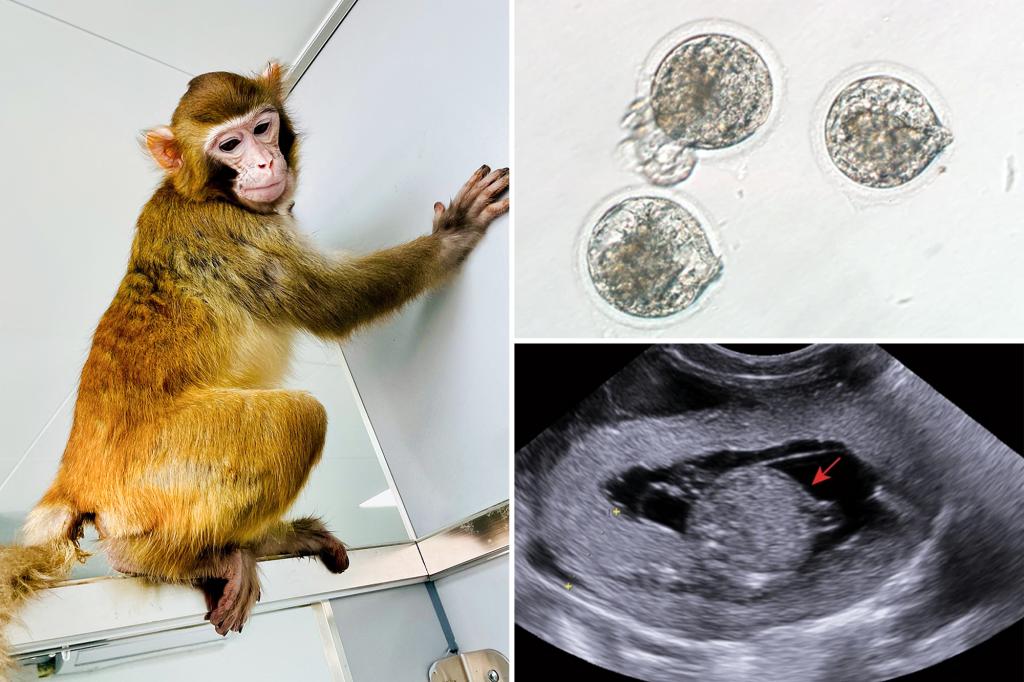A cloned rhesus monkey has reached adulthood for the first time, with the unique primate now more than 3 years old, according to Chinese researchers.
Retro — who was born on July 16, 2020 — was the single birth of 113 cloned embryos created by scientists at the State Key Laboratory of Molecular Developmental Biology and the Institute of Genetics and Developmental Biology at the Chinese Academy of Sciences.
Its birth and development now mark a milestone for cloning research as outlined in a paper published in Nature Communications on Tuesday.
“We have achieved the first living and healthy cloned rhesus monkey, which is a huge step forward that had turned out to be impossible,” researcher Falong Lu told CNN.
Retro, a rhesus monkey using a new cloning method, is now 3.5 years old. Nature Communications/AFP via Getty Images
Retro was born using a slightly different technique than that which gave birth to Dolly the sheep, the first animal cloned by scientists in 1996 who became the standard model.
Researchers at the Chinese Academy of Sciences replaced cloned embryo placentas with embryos produced by in vitro fertilization, a new technique to reduce defects that affect survival rates when using surrogate embryos and mothers.
With the new approach, the researchers created 113 cloned rhesus monkey embryos and were able to implant 11 of them into seven surrogates.
Retro was the first of its kind to reach adulthood, making a major breakthrough in cloning research. Nature Communications /AFP via Getty Images Retro was the only one of 113 cloned embryos to be successfully born. Zhaodi Liao et al/Nature
The experiment resulted in two pregnancies, with Retro being the only one born after the other surrogate carried twins who died 106 days into the pregnancy.
Clones tend to have very low birth and survival rates, as previous experiments have also produced only one or two births.
Last year, a rhesus monkey cloned using traditional cloning methods survived less than 12 hours, according to a paper published in Science Advances.
Given Retro’s age and health, the Chinese researchers’ work could serve as a model for future cloning of rhesus monkeys, the second primate species to have been successfully duplicated.
Researchers believe their new method allows Retro to overcome a defect that often kills clones in the womb. Zhaodi Liao et al/Nature
The same Chinese team was responsible for the birth of two identical cloned cynomolgus monkeys that are still alive today and are more than 6 years old.
“This research is a proof of principle that cloning can be done in different non-human primate species and opens the door to new ways to increase efficiency,” Miguel Esteban, principal investigator with the Guangzhou Institute of Biomedicine and Health at the Chinese Academy of Sciences told CNN.
“Cloned monkeys can be genetically engineered in complex ways that wild-type monkeys cannot; this has many implications for disease modelling,” he added.
The research, however, is not without its critics as advocates and animal rights officials have scrutinized the effects of the procedure and testing on primates.
“Animal cloning requires procedures that can cause pain and distress, and there may be high failure and mortality rates,” the UK’s Royal Society for the Prevention of Cruelty to Animals said in a statement.
Categories: Trending
Source: thtrangdai.edu.vn/en/



